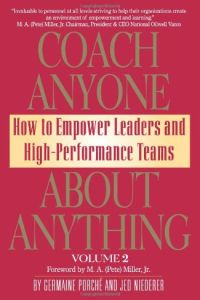
Coach Anyone About Anything, Volume 2
How to Empower Leaders and High-Performance Teams
Recommendation
Executive coaches Jed Niederer and Germaine Porché discuss how organizations also can benefit from having coaches and what you can contribute as a coach. Niederer and Porché provide kernels of wisdom and a variety of coaching tips amid a more than plentiful array of charts, graphs and models. They tell coaches how to help people and their organizations succeed by working with activities already in place “that drive high performance” and countering “those...that dampen it.” Though the book could be better organized, it’s well informed and good hearted. Organizations and coaches will find beneficial counsel here. getAbstract recommends this commonsense manual to coaches, consultants, their clients, and organizational leaders who plan to use coaches or consultants.
Summary
About the Authors
Co-author Germaine Porché is a consultant and president of Eagle’s View Consulting. Jed Niederer is a Vice President of Learning at National Oilwell Varco.
Learners who read this summary also read
Related Skills
























Comment on this summary